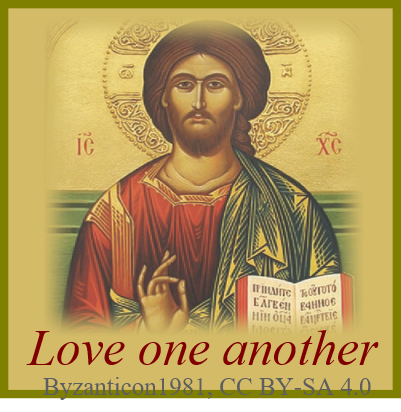15 May 2022
Acts 14:21-27 Apocalypse 21:1-5 John 13:31-33,34-35
Just a week ago we celebrated Vocations’ Sunday and reflected on the call to imitate Jesus, the Good Shepherd who laid down his life for his sheep. Today we are invited to reflect on the fundamental vocation that underpins and unites all vocations in the service of the Lord: the vocation to love. In the gospel reading from John, Jesus commands his disciples to ‘love one another as I have loved you’ (Jn 13:34). A tall order you might say! However, it is clear that the early Christian community took Jesus’ words to heart. This is illustrated by the testimony of a second century philosopher, Aristides. Writing to the Emperor Hadrian in defence of the Christians he states that: ‘Christians love one another. They never fail to help widows; they save orphans from those who would hurt them. If one member of the community has something, he gives freely to those who have nothing…. There is something divine in them.’
The great Church historian, Adolph von Harnack, also noted this extraordinary witness of the Early Christians when he wrote: ‘The new language on the lips of Christians was the language of love. But it was more than a language, it was a thing of power and action.’ As the testimony of Aristides shows, their love was not mere words or pious gestures, but a practical love, expressed in deeds of caring service – service especially of the poor and those most in need. It was the kind of love Augustine referred to when he wrote: ‘It has hands to help others. It has feet to hasten to the poor and needy. It has eyes to see misery and want. It has ears to hear the sighs and sorrows of people. That is what love looks like’. Through their experience of the Risen Christ and the outpouring of his Spirit, the first followers of Jesus had left behind the darkness of night and emerged into the dawning light of God’s love. Thus their lives were changed utterly, and something beautiful was born.
Unfortunately, in contemporary discourse, as Pope Benedict XVI pointed out in his first encyclical letter, God is Love, love has become a much debased and overused word. It is even used to cover up what is the very opposite of love – domination and exploitation, and the abuse of others for one’s own pleasure. The love Jesus commands his disciples to practice is, in the words of von Harnack ‘a thing of power and action’, a reflection and expression of the divine energy that brought the universe into being. It is a love that is ever faithful and constant. The only adequate measure of this love is the enduring love of God the Father for all his children: ‘I have loved you with an everlasting love and am therefore constant in my affection for you’ (Jer 31:3).
There are many kinds and forms of love. Pope Benedict XVI distinguishes three main kinds of genuine love: eros, the spontaneous attraction that tends towards union; filia, the mutual love that exists between friends; and agape or self-less and self-sacrificing love, supremely manifested in the life and death of Jesus Christ. While these three loves may be distinguished, they must not be separated. Writing about erotic love, Louis de Bernières, states that ‘Love is not breathlessness. It is not excitement, it is not the promulgation of eternal passion. That is just being in love, which any fool can do. Love itself is what is left over when being in love has burned away… Those that truly love have roots that grow towards each other underground, and when all the pretty blossoms have fallen from their branches, they find that they are one tree and not two’ (from Captain Corelli’s Mandolin).
The qualities of all genuine love are enumerated by St Paul in his First Letter to the Corinthians: ‘Love is always patient and kind; it is never jealous, boastful or conceited; it is never rude or selfish; it does not take offence, and is not resentful. Love takes no pleasure in other people’s sins but delights in the truth; it is always ready to excuse, to trust, to hope and to endure whatever comes’ (1 Cor 13:4-7). These qualities make love seem very attractive but true love is also demanding. It challenges us to constantly go beyond ourselves, to respond to the needs of others, particularly the most vulnerable. It is when we forget about ourselves and reach out to others that, paradoxically, we discover our true selves. Brian Keenan, reflecting on his experience as a hostage in Beirut for four years (1986-’90) states that ‘It is only when we reach out beyond ourselves, to embrace, understand, and to finally overcome the suffering of another that we become whole in ourselves. We are enlarged and enriched as another’s suffering reveals us to ourselves, and we reach out to touch and embrace.’
True love summons us to leave our comfort zones, to give our time, our energy, our talents, and, indeed our very selves, to others. And to do this not just when we feel in good form good or for a short time, but to do it in season and out of season, in good times and bad, until, in the words of St Paul, our life has been ‘poured out like a libation’ (2 Tim 4:6). This kind of selfless, enduring love demands the best of us and brings out the best in us. It is our fundamental vocation. It is for this that we were made. In the words of the poet, William Blake, ‘…we are put on earth a little space,/That we may learn to bear the beams of love’. Lord, teach us how to love one another as you love us.
Fr Michael McCabe SMA, May 2022

